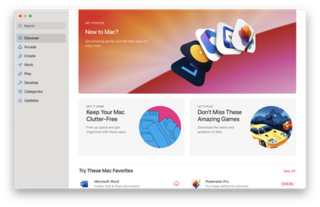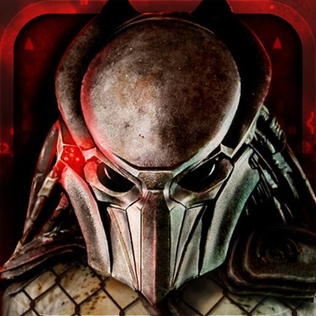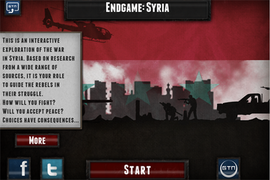The history of macOS, Apple's current Mac operating system formerly named Mac OS X until 2011 and then OS X until 2016, began with the company's project to replace its "classic" Mac OS. That system, up to and including its final release Mac OS 9, was a direct descendant of the operating system Apple had used in its Mac computers since their introduction in 1984. However, the current macOS is a UNIX operating system built on technology that had been developed at NeXT from the 1980s until Apple purchased the company in early 1997.

iWork is an office suite of applications created by Apple for its macOS, iPadOS, and iOS operating systems, and also available cross-platform through the iCloud website.
Twitterrific was a macOS and iOS client for the social networking site Twitter created by The Iconfactory and was the first Twitter desktop client to come to macOS. It lets users view "tweets" or micro-blog posts on the Twitter website in real time as well as publish their own. Twitterrific is closed source software.

Pocket God is a simulation game developed by Bolt Creative, in which the player manipulates an island and its inhabitants. It was released for the iPad, iPhone, and iPod Touch on January 9, 2009, and released for Verizon Wireless on September 1, 2010, Android on December 1, 2010, and Windows Phone on December 4, 2010. The Facebook version was released December 23, 2010.

Flight Control is a time management video game for iOS, Wii, Nintendo DS, Android, and Windows Phone 7 developed by Firemint and first released for iOS on March 5, 2009. The app was a number one bestseller on the App Store in 19 countries simultaneously on April 6, 2009 and has sold over 3.8 million copies. The development and publishing of Flight Control on non-Apple mobile phones is being handled by Namco under license.

Zenonia is an action role-playing game created, developed, and published by Gamevil for iOS, Android, PlayStation Portable, Nintendo DSi, Zeebo and Windows Mobile. It was released on the App Store on May 24, 2009 and on the Google Play Store on March 27, 2010. It was released for the PlayStation Portable on October 12, 2010.

Fishdom is a puzzle game developed by Playrix for Microsoft Windows, Mac OS, Nintendo DS, Nintendo 3DS, Android, iOS, and iPadOS. The game was launched 19 June 2008.
Newsgames are a genre of video games that attempt to apply journalistic principles to their gameplay. Newsgames can provide context to complex situations which might be hard to explain without experiencing the situation firsthand. According to newsgame developers Ian Bogost, Simon Ferrari and Bobby Schweizer, newsgames are a "body of work produced at the intersection of video games and journalism." Journalists use newsgames to expand on stories so the audience can learn more about the information in an immersive way.

The Mac App Store is a digital distribution platform for macOS apps, often referred to as Mac apps, created and maintained by Apple Inc. The platform was announced on October 20, 2010, at Apple's "Back to the Mac" event. Apple began accepting app submissions from registered developers on November 3, 2010, in preparation for its launch.
Submissions for mobile apps for iOS are subject to approval by Apple's App Review team, as outlined in the SDK agreement, for basic reliability testing and other analysis, before being published on the App Store. Applications may still be distributed ad hoc if they are rejected, by the author manually submitting a request to Apple to license the application to individual iPhones, although Apple may withdraw the ability for authors to do this at a later date.

Tiny Wings is an iOS game developed by German game developer Andreas Illiger, released on February 18, 2011. It was the top-grossing game in the App Store for two weeks from late February to early March 2011. The app was voted best iPhone game of the year in 2011 and has sold at least 10.5 million copies on iPhone and 1.8 million copies on iPad based on Apple's Game Center statistics.
An app store, also called an app marketplace or app catalog, is a type of digital distribution platform for computer software called applications, often in a mobile context. Apps provide a specific set of functions which, by definition, do not include the running of the computer itself. Complex software designed for use on a personal computer, for example, may have a related app designed for use on a mobile device. Today apps are normally designed to run on a specific operating system—such as the contemporary iOS, macOS, Windows, Linux or Android—but in the past mobile carriers had their own portals for apps and related media content.
This is a comparison of mobile operating systems. Only the latest versions are shown in the table below, even though older versions may still be marketed.

OS X Mavericks is the 10th major release of macOS, Apple Inc.'s desktop and server operating system for Macintosh computers. OS X Mavericks was announced on June 10, 2013, at WWDC 2013, and was released on October 22, 2013, worldwide.

NarcoGuerra, Spanish for "DrugWar", is a strategy newsgame developed by GameTheNews.net. It was released in June 2013 for Android, PC, Mac, iPhone, iPod Touch and iPad.
The Israeli–Palestinian conflict has been the subject of coverage in several video games, mainly smaller ones developed by independent studios or individual lone wolf developers. Games have been made in various genres, frequently tasking the player to take control of the Prime Minister of Israel. Some can be categorized as serious games, others as newsgames or educational games. Many have been controversial.

The iPad Air 2 is the second-generation iPad Air tablet computer developed and marketed by Apple Inc. It was announced on October 16, 2014, alongside the iPad Mini 3, both of which were released on October 22, 2014. The iPad Air 2 is thinner, lighter and faster than its predecessor, the first-generation iPad Air, and features Touch ID with the height, width and screen size the same as the iPad Air.

Music is a media player application developed for the iOS, iPadOS, macOS, watchOS, visionOS, tvOS, Android, and Windows operating systems by Apple Inc. It can play music files stored locally on devices, as well as stream from the iTunes Store and Apple Music.

Predators, sometimes mislabeled as Robert Rodriguez presents Predators, is a real-time strategy tie-in to the Predator franchise, based on the 2010 film of the same name. The game was developed by independent game developer Angry Mob Games and was released for iOS on July 1, 2010, over a week before the film's theatrical release. The game was later ported to Android and published by Fox Digital Entertainment in 2012.
Sweatshop is a 2011 educational simulation game with tower defence elements. Developed by Littleloud in partnership with and published by Channel Four Television, it was first released for browsers on July 18, 2011. An iOS port titled Sweatshop HD was released in November 2012, but it was removed in February 2013 due to concerns with the game's content.












